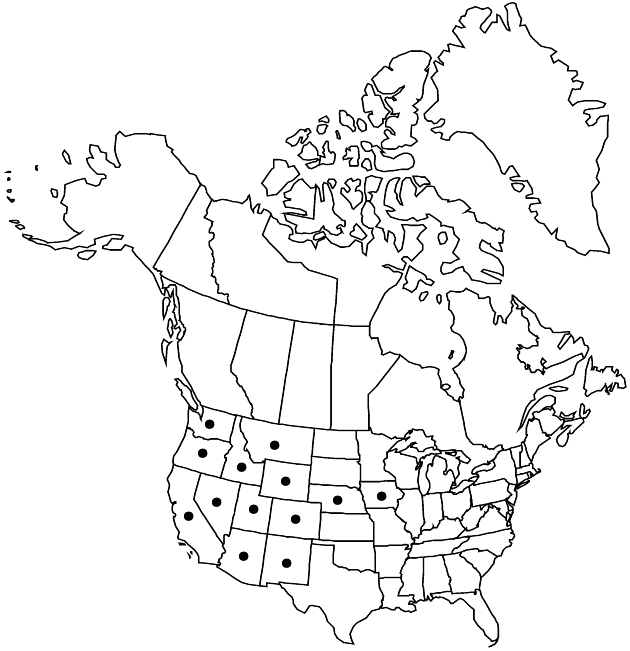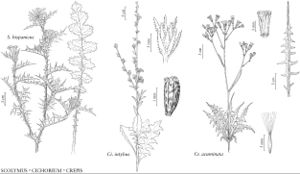Difference between revisions of "Crepis acuminata"
Trans. Amer. Philos. Soc., n. s. 7: 437. 1841.
FNA>Volume Importer |
imported>Volume Importer |
||
| (6 intermediate revisions by 2 users not shown) | |||
| Line 8: | Line 8: | ||
}} | }} | ||
|common_names=Longleaf or tapertip hawksbeard | |common_names=Longleaf or tapertip hawksbeard | ||
| + | |special_status={{Treatment/ID/Special_status | ||
| + | |code=F | ||
| + | |label=Illustrated | ||
| + | }}{{Treatment/ID/Special_status | ||
| + | |code=E | ||
| + | |label=Endemic | ||
| + | }} | ||
|basionyms= | |basionyms= | ||
|synonyms={{Treatment/ID/Synonym | |synonyms={{Treatment/ID/Synonym | ||
|name=Crepis acuminata subsp. pluriflora | |name=Crepis acuminata subsp. pluriflora | ||
|authority=Babcock & Stebbins | |authority=Babcock & Stebbins | ||
| − | }}{{Treatment/ID/Synonym | + | |rank=subspecies |
| + | }} {{Treatment/ID/Synonym | ||
|name=Crepis angustata | |name=Crepis angustata | ||
|authority=Rydberg | |authority=Rydberg | ||
| − | }}{{Treatment/ID/Synonym | + | |rank=species |
| + | }} {{Treatment/ID/Synonym | ||
|name=Crepis seselifolia | |name=Crepis seselifolia | ||
| − | |authority= | + | |authority= |
| + | |rank=species | ||
}} | }} | ||
|hierarchy=Asteraceae;Asteraceae tribe Cichorieae;Crepis;Crepis acuminata | |hierarchy=Asteraceae;Asteraceae tribe Cichorieae;Crepis;Crepis acuminata | ||
| Line 33: | Line 43: | ||
|elevation=1000–3300 m | |elevation=1000–3300 m | ||
|distribution=Ariz.;Calif.;Colo.;Idaho;Iowa;Mont.;Nebr.;Nev.;N.Mex.;Oreg.;Utah;Wash.;Wyo. | |distribution=Ariz.;Calif.;Colo.;Idaho;Iowa;Mont.;Nebr.;Nev.;N.Mex.;Oreg.;Utah;Wash.;Wyo. | ||
| − | |discussion=<p>Crepis acuminata is identified by the narrow, pinnately lobed leaves cleft about half way to the midrib and with long-acuminate apices, heads with relatively few florets, relatively small involucres, and glabrous phyllaries. The fertile diploid form of this species is most widespread (E. B. Babcock 1947). In addition, there are apomictic, polyploid populations. The latter often are more variable in leaf size, shape, and indument, and can be difficult to distinguish from C. pleurocarpa and C. intermedia.</p> | + | |discussion=<p><i>Crepis acuminata</i> is identified by the narrow, pinnately lobed leaves cleft about half way to the midrib and with long-acuminate apices, heads with relatively few florets, relatively small involucres, and glabrous phyllaries. The fertile diploid form of this species is most widespread (E. B. Babcock 1947). In addition, there are apomictic, polyploid populations. The latter often are more variable in leaf size, shape, and indument, and can be difficult to distinguish from <i>C. pleurocarpa</i> and <i>C. intermedia</i>.</p> |
|tables= | |tables= | ||
|references= | |references= | ||
| Line 42: | Line 52: | ||
-->{{#Taxon: | -->{{#Taxon: | ||
name=Crepis acuminata | name=Crepis acuminata | ||
| − | |||
|authority=Nuttall | |authority=Nuttall | ||
|rank=species | |rank=species | ||
| Line 56: | Line 65: | ||
|publication title=Trans. Amer. Philos. Soc., n. s. | |publication title=Trans. Amer. Philos. Soc., n. s. | ||
|publication year=1841 | |publication year=1841 | ||
| − | |special status= | + | |special status=Illustrated;Endemic |
| − | |source xml=https:// | + | |source xml=https://bitbucket.org/aafc-mbb/fna-data-curation/src/2e0870ddd59836b60bcf96646a41e87ea5a5943a/coarse_grained_fna_xml/V19-20-21/V19_275.xml |
|tribe=Asteraceae tribe Cichorieae | |tribe=Asteraceae tribe Cichorieae | ||
|genus=Crepis | |genus=Crepis | ||
Latest revision as of 20:50, 5 November 2020
Perennials, 20–65 cm (taproots deep, woody, caudices swollen, branched, often covered by old leaf bases). Stems 1–5, erect, stout, branched near or beyond middles, tomentulose (at least proximally). Leaves basal and cauline; petiolate; blades elliptic to lanceolate, 8–40 × 0.5–6(–11) cm, margins deeply pinnately lobed, lobes 5–10 pairs, usually lobed (± halfway to midveins, lobes entire), apices long-acuminate, faces ± tomentulose. Heads 30–70(–100+), in compound, corymbiform arrays. Calyculi of 5–7, triangular, tomentulose bractlets 1–2 mm. Involucres cylindro-campanulate, 8–16 × 2–3 mm. Phyllaries 5–8, (medially green) lanceolate, 8–12 mm, (margins yellowish, often scarious), apices acute (ciliate), abaxial faces usually glabrous, sometimes sparsely tomentulose, adaxial glabrous. Florets 5–10(–15); corollas yellow, 10–18 mm. Cypselae pale yellowish brown, subcylindric, 6–9 mm, apices ± narrowed (not beaked), ribs 12; pappi white, 6–9 mm. 2n = 22, 33, 44, 55, 88.
Phenology: Flowering May–Aug.
Habitat: Dry rocky hillsides, ridges, grassy flats, open pine woods
Elevation: 1000–3300 m
Distribution

Ariz., Calif., Colo., Idaho, Iowa, Mont., Nebr., Nev., N.Mex., Oreg., Utah, Wash., Wyo.
Discussion
Crepis acuminata is identified by the narrow, pinnately lobed leaves cleft about half way to the midrib and with long-acuminate apices, heads with relatively few florets, relatively small involucres, and glabrous phyllaries. The fertile diploid form of this species is most widespread (E. B. Babcock 1947). In addition, there are apomictic, polyploid populations. The latter often are more variable in leaf size, shape, and indument, and can be difficult to distinguish from C. pleurocarpa and C. intermedia.
Selected References
None.
